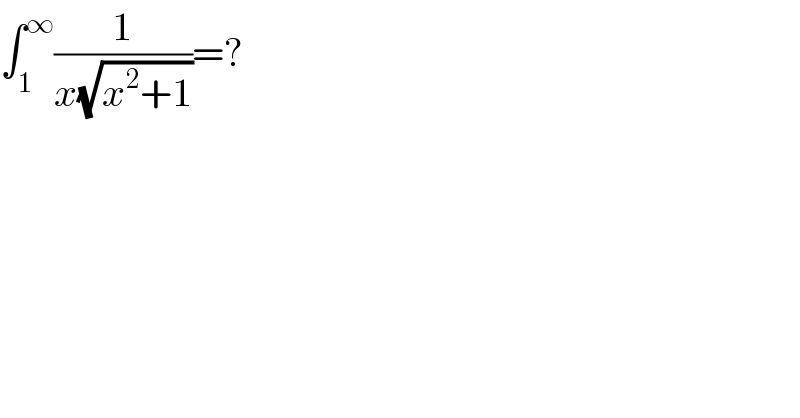
Question and Answers Forum
Question Number 66728 by Tony Lin last updated on 19/Aug/19

Commented by mathmax by abdo last updated on 19/Aug/19
![changement x=sht give ∫_1 ^(+∞) (dx/(x(√(1+x^2 )))) =∫_(argsh(1)) ^(+∞) ((ch(t)dt)/(sh(t)ch(t))) =2∫_(ln(1+(√2))) ^(+∞) (dt/(e^t −e^(−t) )) =_(e^t =u) 2 ∫_(1+(√2)) ^(+∞) (1/(u−u^(−1) ))(du/u) =2 ∫_(1+(√2)) ^(+∞) (du/(u^2 −1)) =∫_(1+(√2)) ^(+∞) {(1/(u−1))−(1/(u+1))}du=[ln∣((u−1)/(u+1))∣]_(1+(√2)) ^(+∞) =−ln∣((1+(√2)−1)/(1+(√2)+1))∣ =−ln(((√2)/(2+(√2))))=ln(((2+(√2))/(√2))) =ln(1+(√2))](Q66741.png)
Commented by Tony Lin last updated on 19/Aug/19

Answered by Souvik Ghosh last updated on 19/Aug/19
![⇔let x=tan Θ⇔dx=sec^2 Θ.dΘ so I=∫_(π/4) ^(π/2) ((sec^2 ΘdΘ)/(tanΘ×sec Θ)) I=∫_(π/4) ^(π/2) cosec Θ dΘ I=−ln[(√2)−1]](Q66729.png)
Answered by Souvik Ghosh last updated on 19/Aug/19
![⇔let x=tan Θ⇔dx=sec^2 Θ.dΘ so I=∫_(π/4) ^(π/2) ((sec^2 ΘdΘ)/(tanΘ×sec Θ)) I=∫_(π/4) ^(π/2) cosec Θ dΘ I=−ln[(√2)−1]](Q66730.png)
Commented by Tony Lin last updated on 19/Aug/19

